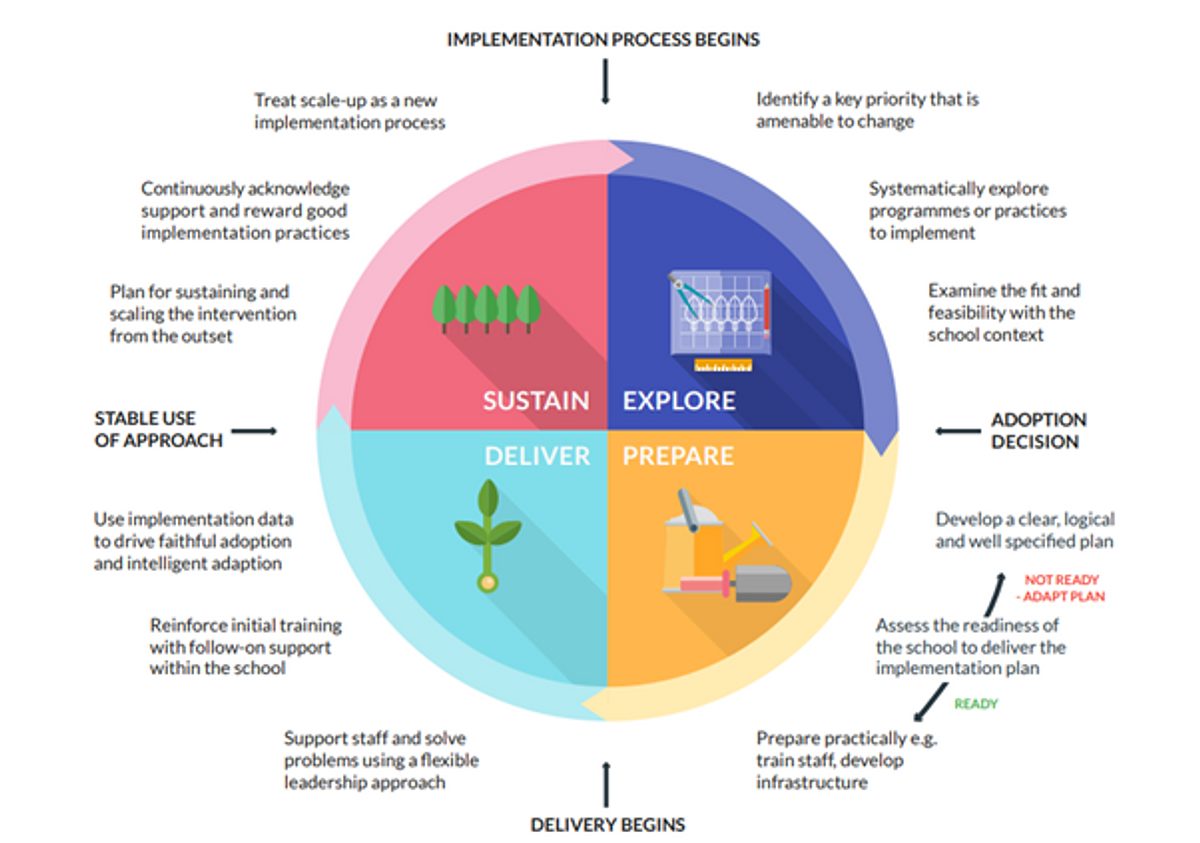

Research School Network: Managing Change: Reflections on using the Education Endowment Foundation’s Implementation Guidance Managing Change: Reflections on using the Education Endowment Foundation’s (EEF) Implementation Guidance
—
Managing Change: Reflections on using the Education Endowment Foundation’s Implementation Guidance
Managing Change: Reflections on using the Education Endowment Foundation’s (EEF) Implementation Guidance
Share on:

by Unity Research School
on the
By Andy Hodgkinson, CEO, Zenith Multi Academy Trust
Leaders at all levels often experience frustration when their well-intentioned ideas fail to land properly, and this was certainly the case when I talked to leaders on becoming new CEO at Zenith. As one of our Headteachers noted, this is hardly surprising given how we get fantastic training to learn how to teach, but far less when it comes to how to lead.
With this in mind, we decided to turn to the evidence base to see what “lessons we could learn”, and so have a more strategic approach to implementing change. To this end, last year we commissioned a bespoke project with the EEF involving leaders at all levels, to last for 18 months. We also saw this as a way to bring alongside some other schools currently not part of Zenith, in order to have a wider network with which to engage, and so be truly outward facing as a Trust.
Our EEF project was created in partnership with Unity Research School. Exploration of the issue we were seeking to target enabled us to co-construct the programme to give the cross-trust focus the best chance of success. We launched in February 2022 with in inspiring keynote input to Headteachers and senior staff from Andy Samways, Unity Research School’s Director of Research School. This was followed up by a twilight Trust INSET to all middle leaders on how to make best use of the EEF implementation guidance document. A year later, this was followed up with INSET on utilising the EEF’s Professional Development framework. Sequencing these inputs, threading follow-on focus and aligning next steps enabled us to create the shared vision so essential if we were to secure shared, improved practice. From the outset we sought to bring this focus on implementation alongside a key priority for improvement – for us it is SEND in mainstream. As part of the project we were then able to commission work with Gary Aubin, EEF SEND Advisor, as SEND is our biggest area for development as a Trust, and it was a moral imperative for us not to lose any time. Nonetheless, in relation to all of the other excellent EEF documents, we consciously refrained from pushing these too early on, as we were very clear that we needed to better at the “how”, before engaging with the “what”. This was always part of the wider strategy, so we did not once again replicate disappointments of old, whereby good ideas do not lead to the change we envisage.
Now that we are well into project, EEF implementation plans, with a few “Zenith tweaks”, are used as a template by many middle and senior leaders across the Trust, and all school development plans now follow a consistent, EEF-informed format. Feedback has been very positive, especially in relation to the new found clarity of intended outcomes. The model of explore, plan, deliver, and sustain is now beginning to seep into the DNA of the Trust and school strategic planning. The ‘uncommon common sense’ is starting to become ‘more common’ in the work of leaders at all levels of the trust and we have a shared language to take us confidently in to change in the terms ahead.

It is too early to gauge real impact and we are especially mindful of the EEF’s caveats around “false claims” in relation to the evidence base. We are only too aware that the EEF is about “best bets” rather than guarantees. However, what we do know is that all our plans seem to be aligning more seamlessly, as if by magic, and there is greater clarity amongst leaders in relation to their intentions.
The views of Dan Steel, Headteacher of The King John School echo this: “One example of how the EEF implementation guidance is having an impact on the school is through our work on Quality First Teaching with Gary Aubin. In the past, I suspect some of our hardworking middle leaders might have initiated lots of different projects after the training, but it would not have been strategically joined up or sustained. Instead, our new CPD Deputy Headteacher has taken the lead on this, prioritising whole school INSET and departmental training to focus on just one key aspect of the EEF’s “5‑a-day” approach, to really try and have impact. We are really starting to see the results of this in more consistent lesson planning, and engagement of students with SEND”.
Governors too are starting to see greater clarity during LGB meetings. Indeed, they have even asked for their own EEF input session at our next annual governance conference!
More from the Unity Research School
Show all news

Pupil Premium and SEND: learning without labels
Learning without labels
